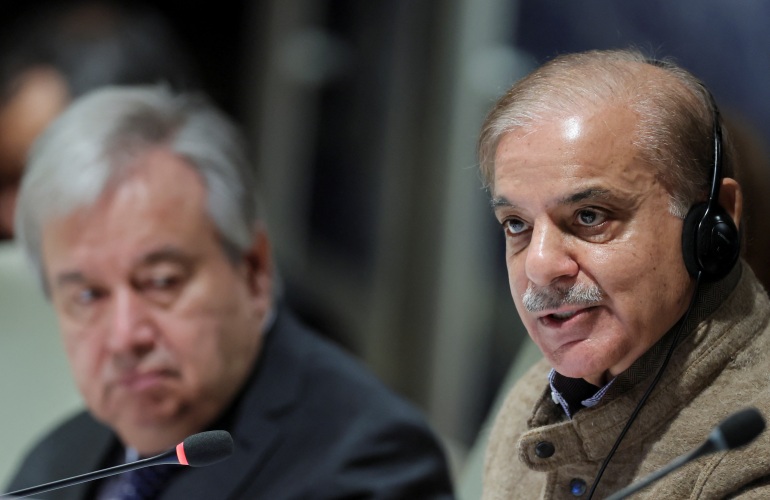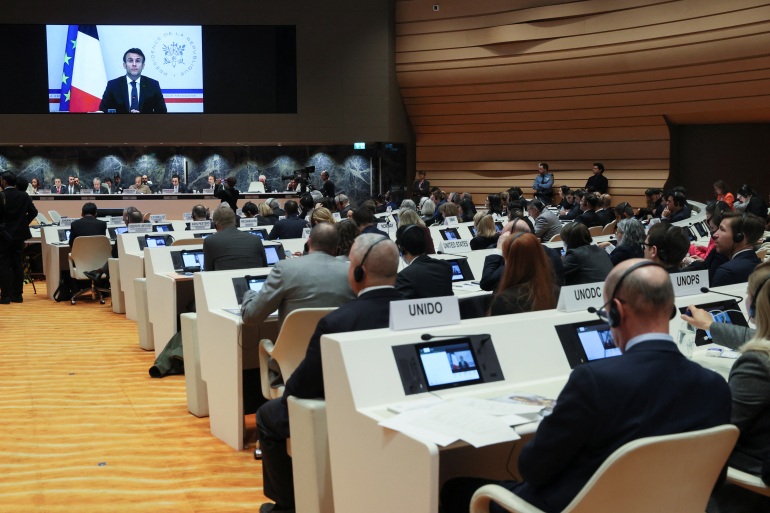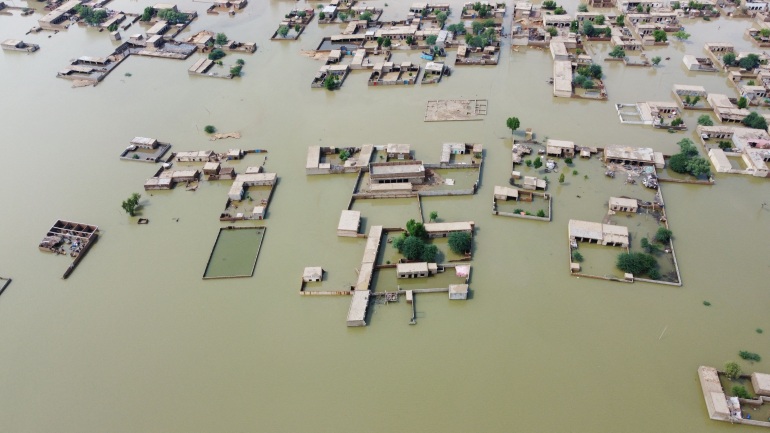Pakistan says donors at an international conference in Geneva have pledged to give more than $9bn to help it rebuild following last year’s devastating floods.
Pakistan is hosting the event in Geneva on Monday with the United Nations as it seeks international assistance to cover around half of a total $16.3bn recovery bill.
Prime Minister Shehbaz Sharif and UN Secretary-General Antonio Guterres kicked off the one-day conference, attended by officials from nearly 40 other countries as well as private donors and international financial institutions.
The unprecedented floods caused by melting glaciers and record monsoon rains last year affected more than 33 million Pakistanis, killing more than 1,700 people and pushing about nine million others into poverty, according to the UN.
Thousands of people are still living in open areas, tents and makeshift homes in Sindh and Balochistan, the two worst-hit provinces, with stagnant water still present in many areas.
Pakistani Deputy Foreign Minister Hina Rabbani Khar said the final tally came in above a target for the international community.
“Taken as a whole, these commitments total more than $9 billion and from what we know so far, these are all additional commitments from what was already given in terms of humanitarian assistance, etc., from both bilateral and multilateral partners,” she said, adding that a number of delegations had also offered up in-kind support.
‘We’re racing against time’
Earlier, Guterres praised Pakistan and its people for responding to “this epic tragedy with heroic humanity”.
“We must match the heroic response of the people of Pakistan with our own efforts and massive investments to strengthen their communities for the future,” he said.
“Pakistan is doubly victimised by climate chaos and a morally bankrupt global financial system,” the UN chief added. “No country deserves to endure what happened to Pakistan.”

Addressing the summit earlier on Monday, Sharif called for a “new coalition of the willing” among the international community, “one that can save lives and put them on a path to responsible global citizenship”.
“Today’s meeting is an attempt to give my people another chance at getting back on their feet,” he said, adding that his government needed at least $8bn from outside donors over the next three years to rebuild the country.
“We are racing against time,” he said.
Leaving for Geneva today to co-host International Conference on Resilient Pakistan along with UN Secretary General. Will take the opportunity to present the case of flood victims before the world. I will also throw light on steps my govt has taken for relief & rehabilitation. 1/3
— Shehbaz Sharif (@CMShehbaz) January 8, 2023
In a column for British newspaper The Guardian on Friday, Sharif said Pakistan “simply cannot do this alone”.
“These flooded areas now look like a huge series of permanent lakes, transforming forever the terrain and the lives of people living there. No amount of pumps can remove this water in less than a year; and by July 2023, the worry is that these areas may flood again,” he wrote.
According to the Global Climate Risk Index, Pakistan is responsible for less than one percent of global emissions but it remains among the top 10 nations vulnerable to climate change.

Pakistan’s 4RF plan
Islamabad says the Geneva conference is focused on two objectives: the “Resilient Recovery, Rehabilitation, and Reconstruction Framework (4RF)” strategy to secure international support, and to find a way to build long-term climate resilience and adaptation against climate change in Pakistan.
Khalil Hashmi, Pakistan’s permanent representative at the UN office in Geneva, said: “The objective is to secure international support for the 4RF, which includes institutional, financial and implementation arrangements for post-flood recovery, rehabilitation and reconstruction. The conference will help us forge long-term partnerships to strengthen Pakistan’s climate resilience and adaptation.”

Last year, Pakistan prepared a Post-Disaster Needs Assessment (PDNA) report with the help of the UN and other global bodies, which estimated the country needed $16.3bn to rebuild its economy and infrastructure and called for global help.
In December, the UN said despite an appeal for $816m in urgent funds for Pakistan, it received only $262m – a mere 32 percent of the target amount.
The floods came amid a dire economic crisis in Pakistan, which last month saw its foreign reserves depleted to less than $6bn, enough to cover just about a month of imports.
Pakistan is also seeking immediate financial assistance from the International Monetary Fund as well as from friendly countries such as Saudi Arabia and China to shore up its faltering economy and prevent a default.
Ali Tauqeer Sheikh, an Islamabad-based climate change analyst, told Al Jazeera that he did not expect substantial commitments from other nations and agencies at the Geneva conference.
“I don’t think anybody will offer an open chequebook to Pakistan, though, with the number of people attending, I am sure they will make some pledges and show some action,” he said.
“If Pakistan manages to garner promises of more than $1bn from this conference, it can be termed a short-term success.”